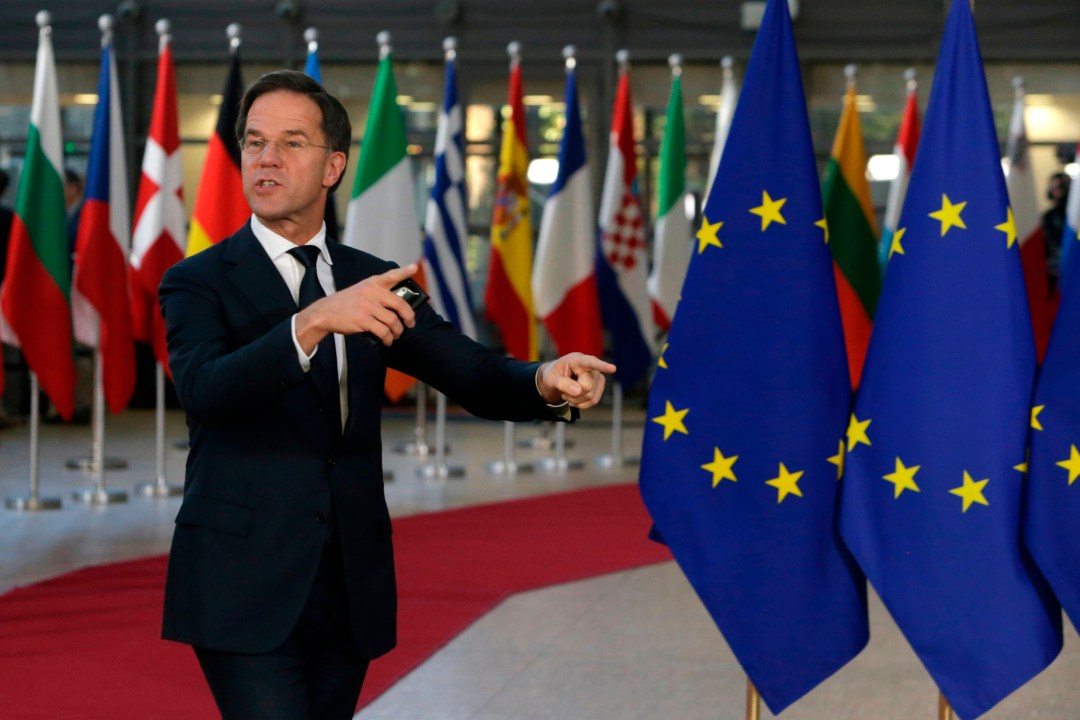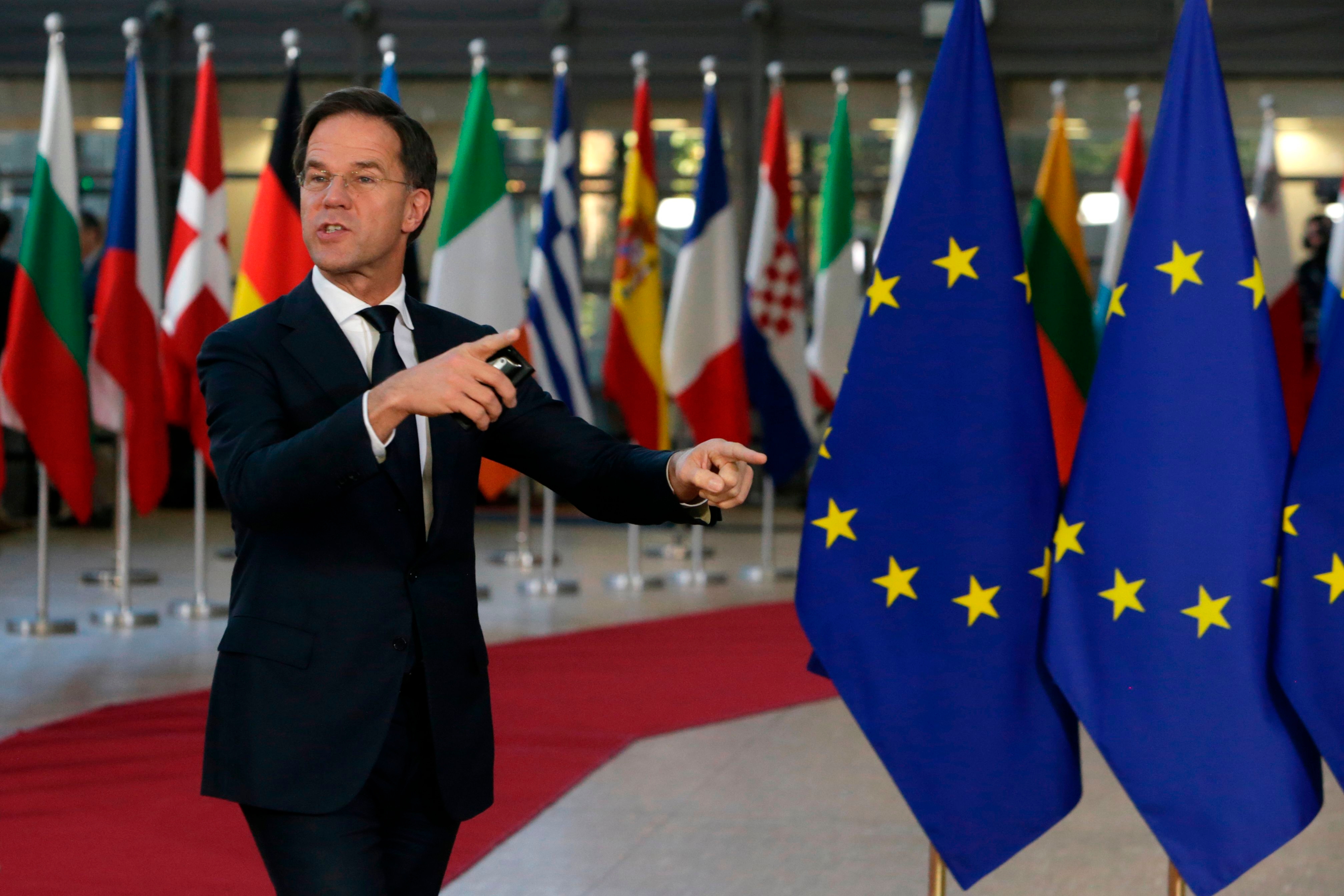Dutch Prime Minister Mark Rutte has taken on the mantle of ‘Dr No’ across the capitals of Europe after he took a tough stance on the EU’s coronavirus bailout fund. But in the Netherlands, most people supported his stance on EU integration.
At the talks, Rutte successfully led the ‘frugal five’ countries – the Netherlands, Austria, Sweden, Denmark and Finland – in their battle to reduce the EU’s proposed coronavirus subsidies from €500 billion to €390 billion (£450 to £350 billion). The countries also ensured an economic conditions brake was attached to another €310 billion (£280 billion) in loans, which are expected to go mostly to Italy and Spain.
It was a tense set of talks in Brussels, with threatened walkouts, late nights and, for the first time in decades, no Britain fighting in the Netherlands’s corner. In fact, some wondered if the three-times Dutch Prime Minister was becoming ‘a new Thatcher’ in the UK’s absence. The Italian media dubbed him ‘Dr Superstrict’, Hungarian Prime Minister Viktor Orbán said he thought Rutte ‘hated’ him and French President Emmanuel Macron reportedly compared him to David Cameron (by pointing out that Cameron came to a sticky political end).
The UK and the Netherlands have traditionally been liberal allies in European negotiations, leading to mournful Dutch headlines like ‘Don’t leave me this way’ after the Brexit referendum in 2016.
But Rutte has a keen eye on domestic politics when he rallies against EU spending. At the moment, he has no majority in either house of the Binnenhof, his coalition government is made up of four parties, he has rivals on the far right and an economy that has gone from prosperous to severely troubled just before the 2021 general election.
The Netherlands has always felt suspicious of further political integration
According to a poll last weekend by Peil.nl, his attempt to play hardball with the European Union worked: 51 per cent of the Dutch thought Rutte did a good job in Europe, and slightly more people were positive (36 per cent) than negative (34 per cent) about the Dutch deal, which included a €1.92 billion (£1.73 billion) EU budget rebate.
‘The way the Dutch view Europe has always been calculating,’ says Clara van de Wiel, European correspondent for the NRC Handelsblad.
In the past, we always had the United Kingdom to defend that [frugal] position during budget negotiations and now the Dutch are more on their own. There’s also still strong sentiment on the way that the Europeans managed the last crisis and how Greece had to be saved: Rutte was very cautious not to give the impression that Dutch taxpayers’ money was given away again.
Although the Netherlands was among the six founding fathers of the EU, it has always promoted trade and felt suspicious of further political integration. But thanks to a recent growth in Eurosceptic parties, such as Geert Wilders’ Party for Freedom (PVV) and the new Forum for Democracy (FvD), Rutte’s liberal VVD is trying to avoid being seen as too soft on the EU.
The main criticism of Rutte’s recent performance came from supporters of the Dutch far-right: the Peil.nl poll showed 91 per cent of PVV supporters and 84 per cent of FvD voters were negative about the European deal. But Rutte and his party are still riding high on the ‘rally around the flag’ effect following his mostly positive handling of the coronavirus crisis.
Tom van der Meer, a professor of political science at Amsterdam University says:
In the Netherlands, [Rutte is] not known for being very principled… The impression people have of him in Europe isn’t the same. In the Netherlands you’d describe him as the manager who allows other parties to shine, who’s able to change tactics or positions if need be. That plays to his strengths in Europe: there, he’s not one of the managers but one of the frugal countries who is able to deal with these multiple positions without making things personal.
Rutte, for example, told Dutch broadcaster NOS that if even ‘someone’ (like Macron) slammed a hand on the table – as had been rumoured during the third late night of talks – it was probably due to ‘tiredness’, stressing that personal relations were good and everyone was doing their best for their country. He leaves it to his finance ministers to be indiscreet. In 2017, the Dutch minister of finance Jeroen Dijsselbloem implied southern European states wasted money on ‘alcohol and women’ when asking for more European subsidies. And in March, the current finance minister Wopke Hoekstra sparked fury when he asked for research into why certain EU countries didn’t have the same economic ‘buffers’ as the Netherlands in preparation for bad times.
Pollster Maurice de Hond says that although Rutte deals with things diplomatically, there’s a lot of support for forthright Eurosceptic views among the Dutch, who look with dismay at the lower pension ages of France and Italy. ‘It’s a difficult discussion if you are sending money to Europe but saying we don’t have enough money to pay pensions here,’ he says.
It’s a view that has plenty of political supporters. In parliament, some representatives have criticised what they see as a sneaky cash (and power) grab by the European Commission. Mahir Alkaya, financial affairs spokesman for the Dutch Socialist Party, wanted a no-strings solidarity fund rather than ever-closer integration:
There are many things in that fund that have nothing to do with corona, but the European Commission has used the momentum to push forward with, for example, the ambition for digitalisation… Nobody would argue that improving your budget and making sure you can pay for what you’re spending money on is a good thing but the member states are the best ones to reform their economy, not the European Commission.
However, others believe that the Netherlands will depend on Europe increasingly in a post-corona, post-Brexit economy (and Rutte might want a job there too). ‘If the internal market collapses because of the corona crisis, that is going to hit the Netherlands in a major way because we are such a small export nation and the global trade lines are very disrupted,’ says Handelsblad‘s Van de Wiel. ‘In the coming years we’ll need Europe even more.’
But whatever the future for the Netherlands and for its Prime Minister, for now Rutte is enjoying the benefits of taking a few steps in Britain’s Eurosceptic shoes.







Comments